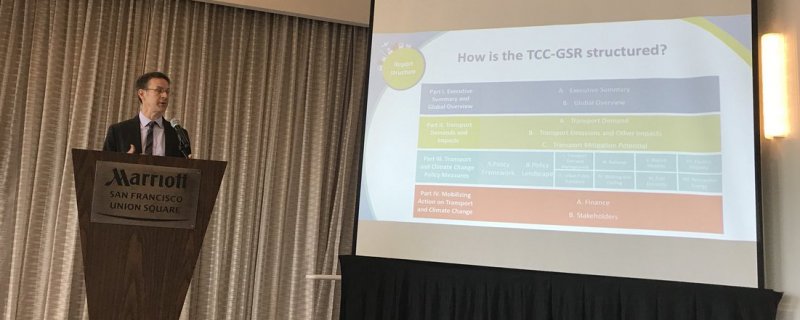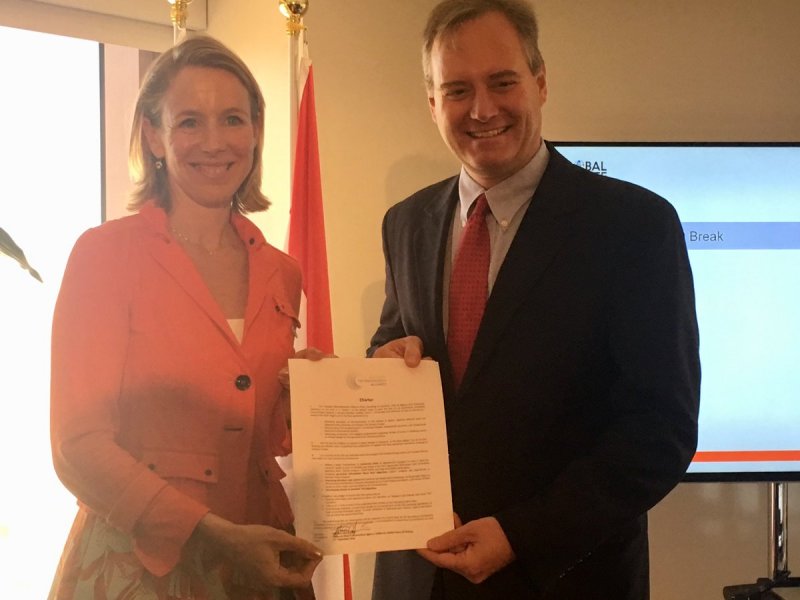Transport Sector Makes New Commitments and Allies at Global Climate Action Summit

The Global Climate Action Summit (GCAS), held from 12 to 14 September 2018 in San Francisco, brought together states and regions, cities, businesses and investors to further accelerate climate action to put the globe on track to realize the ambitious goals of the Paris Agreement. Decarbonisation of most sectors is necessary to achieve the 1.5 degree Celsius goal of the Paris Agreement and to prevent the most dangerous impacts of climate change.
The main slogan of GCAS was “Take Ambition to the Next Level” and to “Step Up” actions. New commitments and more ambitious targets to existing commitments have been made in the preparation phase before GCAS or during the summit itself. The transport sector, currently responsible for 14% of global greenhouse gases, will have to achieve net decarbonisation by mid-century to make a proportional contribution to the Paris Agreement targets.
In our overview of sustainable transport events at GCAS about two dozen affiliate events with a focus or connection to transport have been identified. Many of these events resulted in new commitments on transport, which we attempted to collect in the following list*:
Affiliate Event on the Transport and Climate Change Global Status Report 2018
The Partnership on Sustainable, Low Carbon Transport (SLoCaT) gave a preview of the forthcoming Transport and Climate Change Global Status Report 2018 (TCC-GSR). The event was moderated by SLoCaT board member Margarita Parra and featured SLoCaT Research Director Karl Peet presenting an overview of report structure and contents, followed by a panel discussion including participation by Rana Adib (REN21), Adam Cohen (UC Berkeley), Ramon Cruz (ITDP), Projjal Dutta (UITP and NYMTA) and Carlosfelipe Pardo (numo) highlighted the importance of climate action in transport through varied policy targets and measures in the areas of renewable energy, shared mobility, walking and cycling, public transport, and new mobility/demand management.
 SLoCaT Research Director Karl Peet introducing the TCC-GSR #TransportClimateStatus
SLoCaT Research Director Karl Peet introducing the TCC-GSR #TransportClimateStatus
The report is expected to be officially launched in December 2018 during COP 24 in Katowice, Poland. For more information, please refer to the TCC-GSR website.
New Members join the Transport Decarbonisation Alliance
The Transport Decarbonisation Alliance (TDA) welcomed three new members during the week of GCAS: Deutsche Post DHL, the State of California and Brisa. Shortly before the official start of GCAS on Wednesday, September 12, Deutsche Post DHL Group announced their membership to the TDA through a tweet on their official Twitter account. California signed the charter and became the first North American TDA member during an event on September 12 organized by the Netherlands and TDA. On September 14, Brisa, the largest private Portuguese infrastructure manager, joined the TDA as the 20th official member.

Stientje van Veldhoven, State Secretary for Infrastructure and Water Management of The Netherlands, and Brian Annis, Secretary of the California State Transportation Agency, hold the TDA Charter signed by California
California Makes New Commitments on Transport
As the host, California was eager to lead on commitments for mitigation of climate change. At the beginning of the GCAS week Governor Jerry Brown signed a bill to aim to derive all its retail electricity from renewable sources by 2045. At GCAS, Governor Brown signed several bills to promote the uptake of electric vehicles in support of the existing goal of having five million zero-emission vehicles on California’s roads by 2030.
Accelerated Activities on E-Mobility
The ZEV Alliance welcomed the German state Baden-Wuerttemberg as a new member. At GCAS various mayors and political leaders highlighted their activities on a transition to clean fleets and, according to The Climate Group, 26 states/regions, major cities and businesses committed to 100% zero emission vehicle targets: 12 states and regions joined the Under2 Coalition Zero Emissions Vehicle Challenge, 12 cities committed to C40 Green & Healthy Streets (Fossil Fuel Free Streets) Declaration and 2 companies joined EV100 by The Climate Group. Earlier in the week the Birmingham Declaration, promoting the deployment of zero emission vehicle on a global scale, has been declared and signed by 14 countries/regions at the Zero Emission Vehicle Summit 2018.
Commitments made by states in India contributed to e-mobility commitments at GCAS: Telangana will deploy 2,000 electric buses by March 2019 and electrify the complete rickshaw fleet. Pune announced that all diesel buses will be removed and 500 electric buses will be added by 2020.
Overall, strong commitments on electrifying mobility have been made. The various statements together aim for more than 3.5 million additional zero emission vehicle charging points by 2025 and a commitment was to achieve zero-emission hydrogen for transport by 2030.
SLoCaT tracks major plans and targets by countries, cities/states and companies on electric mobility in the E-Mobility Overview of Targets and Trends.
Commitments to Reduce Emissions by Trucks and Freight Transport
Freight transport emission have been increasingly rapidly in recent years. Global stakeholders are aware of this issue and GCAS offered a platform to make new commitments on heavy duty vehicles: IKEA announces that they will implement emission-free deliveries by 2020 in 5 cities. Zero-emission home deliveries will be applied to Amsterdam, Los Angeles, New York, Paris and Shanghai.
WBCSD launched at GCAS the project “Transforming Heavy Transport”, which aims to reduce emissions from freight and logistics operations including air, sea, land and transshipment centers. The vision of the new project is to achieve net-zero freight and logistics emissions by 2050.
The Drive2Zero Pledge was launched at GCAS by CALSTART with the goal to reduce pollutants and greenhouse gases of medium- and heavy duty vehicles. The activity seeks to make zero emission technology commercially viable in most significant markets by 2025 and to support further activities that can lead to zero emission technology dominating new commercial vehicle sales globally by 2040. The pledge has been made by the mayor of Oslo and others.
Other Transport Sector Commitments
United Airlines made the commitment to halve greenhouse gas emissions by 2050 of 2005 levels. This pledge represents the equivalent of removing 4.5 million vehicles from the road each year. United Airlines intends to increase the use of biofuels up to 30% biofuel blend. A first flight with a biofuel blend was performed on Friday from San Francisco and Zurich.
The International Transport Worker’s Federation (ITF) with 20 million workers committed support for C40’s fossil-fuel-free city streets by 2030.
One of the largest companies and vehicle manufacturer in India, the Mahindra Group announced to become carbon neutral by 2040.
29 philanthropists announced at GCAS to raise funds from USD 500 million to USD 4 billion over the next five years to combat climate change. This decision helps to advance work on sustainable, low carbon transport.
*This article does not provide an exhaustive list of GCAS commitments and plans on transport.